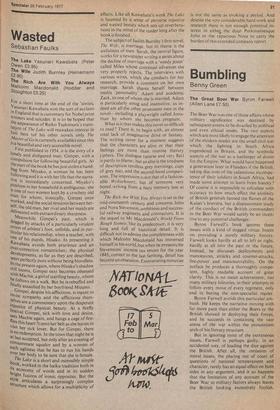Wasted
Sebastian Faulks
The Lake Yasunari Kawabata (Peter Owen £3.95) The Wile Judith Burnley (Heinemann £2.90) The Rich Are With You Always Malcolm Macdonald (Hodder and Stoughton £5.25) For a short time at the end of the 'sixties, Yasunari Kawabata won the sort of acclaim in England. that is customary for Nobel prize winners and suicides. It is to be hoped that the appearance of Reiko Tsukimura's trans'Non of The Lake will reawaken interest in him here (of his other novels only The
M. f G Master of is currently available) since this is a beautiful and very accessible novel.
First published in 1954, it is the story of a lonely and disfigured man, Gimpei, with a compulsion for following beautiful girls At the start of the book he has just stolen a handbag from Miyako, a woman he has been following and it is with her life that the narrative is immediately concerned. Miyako s position in her household is ambiguous: she is one of two women kept by a crochety old man for whom, ironically, Gimpei once worked, and the social tensions between herself, the old man, her rival and her maids are delineated with extraordinary sharpness.
Meanwhile Gimpei's past, which is dogged by attacks of a particularly virulent strain of athlete's foot, unfolds, and in particular his relationship, when a teacher, with one of his pupils, Hisako. In presenting it Kawabata avoids both prurience and an over-corrective romanticism; the physical developments, as far as they are described, seem perfectly pure without being bloodless. In the present again, where Hisako's shadow still looms, Gimpei next becomes obsessed With Mach ie, a girl of startling beauty, whom he follows on a walk. But he is rebuffed and finally assaulted by her boyfriend Mizuno. Ginnpei, despite his afflictions, is meant to invite sympathy and the afflictions themselves are a commentary upon the desperate injustice of physical beauty. At a firefly festival Gimpei, sick with love and desire, sees Machie again, and hangs a cage of fireflies (his heart ?) onto her belt as she leaves to !visit her sick lover. But for Gimpei, there Is no redemption. In the town that night he is at last accepted, but only after an evening of consummate squalor and by a woman of such ugliness that he has to run his hands over her body to be sure that she is female. , The Lake is a short and ostensibly simple book, worked in the haiku tradition both in
its economy of words and in its sudden bright fusions of ironic opposites. But the Style articulates a surprisingly complex structure which allows for a multiplicity of effects. Like all Kawabata's work The Lake is haunted by a sense of perverse injustice and wasted beauty which sets up reverberations in the mind of the reader long after the book is finished.
The subject ofJudith Burnley's first novel, The Wile, is marriage, but its theme is the awfulness of men. Sarah, the central figure, works for a newspaper writing a series about the decline of marriage with a 'weedy jester' called Miles whose continual advances she Very properly rejects. The interviews with various wives, which she conducts for her research, provide a comment on her own marriage. Sarah shares herself between media 'personality' Adam and academic Zack, to one of whom she is Married. Adam is particularly smug and insensitive, as indeed are all the other prominent men in the novel—including a playwright called Jonathan by whom she becomes pregnant.
What is it that makes this novel so difficult to read? There is, to begin with, an almost total lack of imaginative drive or fantasy. The writing never for a moment suggests that the characters are alive or that their feelings are more than routine literary ciphers. The dialogue (sparse and very flat) is partly to blame; but so also is the tiredness of description (endless grey mornings, cups of grey tea), and the second-hand comparisons. The impression is not that of a fashionable Weltschmerz, but of someone very bored writing from a hazy memory late at night.
The Rich Are With You Always is set in the mid-nineteenth century and concerns John and Nora Stevenson, ambitious and successful railway engineers and contractors. It is the sequel to Mr Macdonald's World From Rough Stones; like its predecessor, it is very long and full of historical detail. It is difficult not to admire the completeness with which Malcolm Macdonald has immersed himself in hisworld, but when he presents the Stevensons' income tax return for the year 1845, correct to the last farthing, detail has become an obsession. Enumerating minutiae
is not the same as evoking a period. And despite the very considerable hard work and research there is not enough potential interest in eithei, the dour Parkinsonesque John or the rapacious Nora to carry the burden of this extended company report.


































 Previous page
Previous page